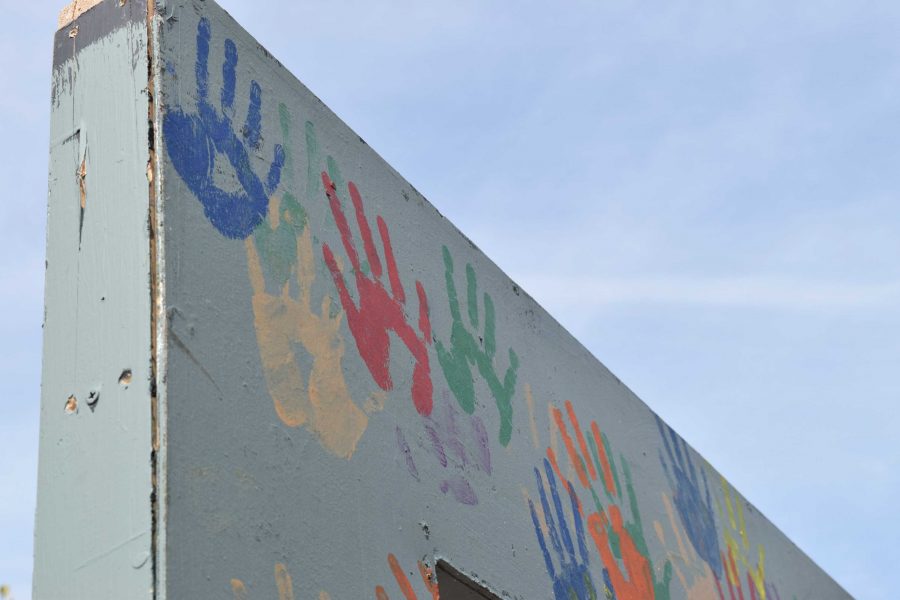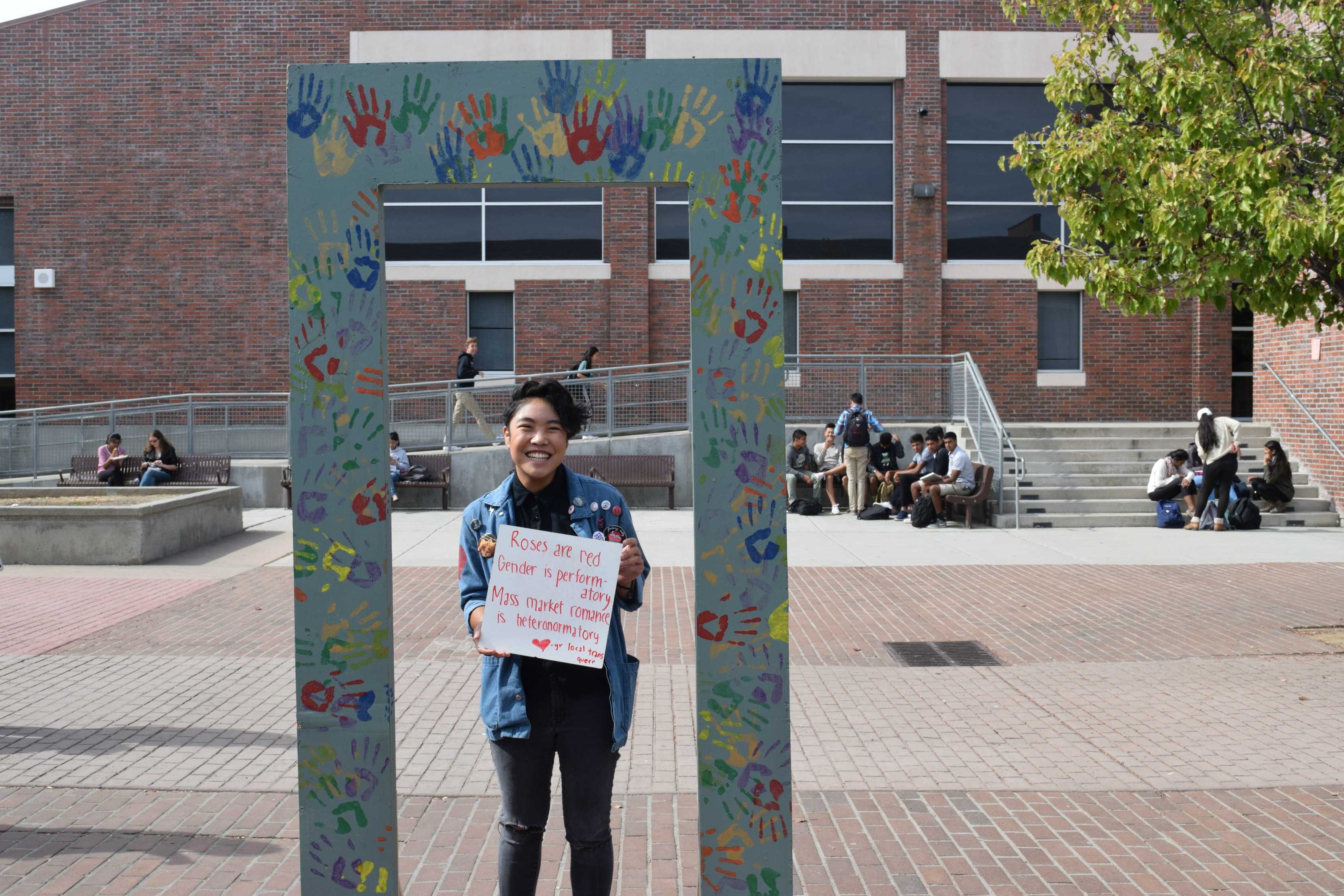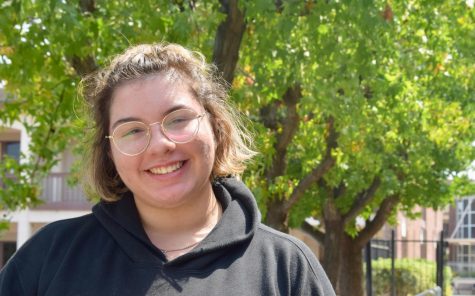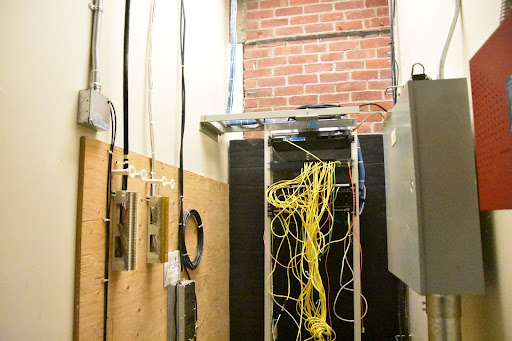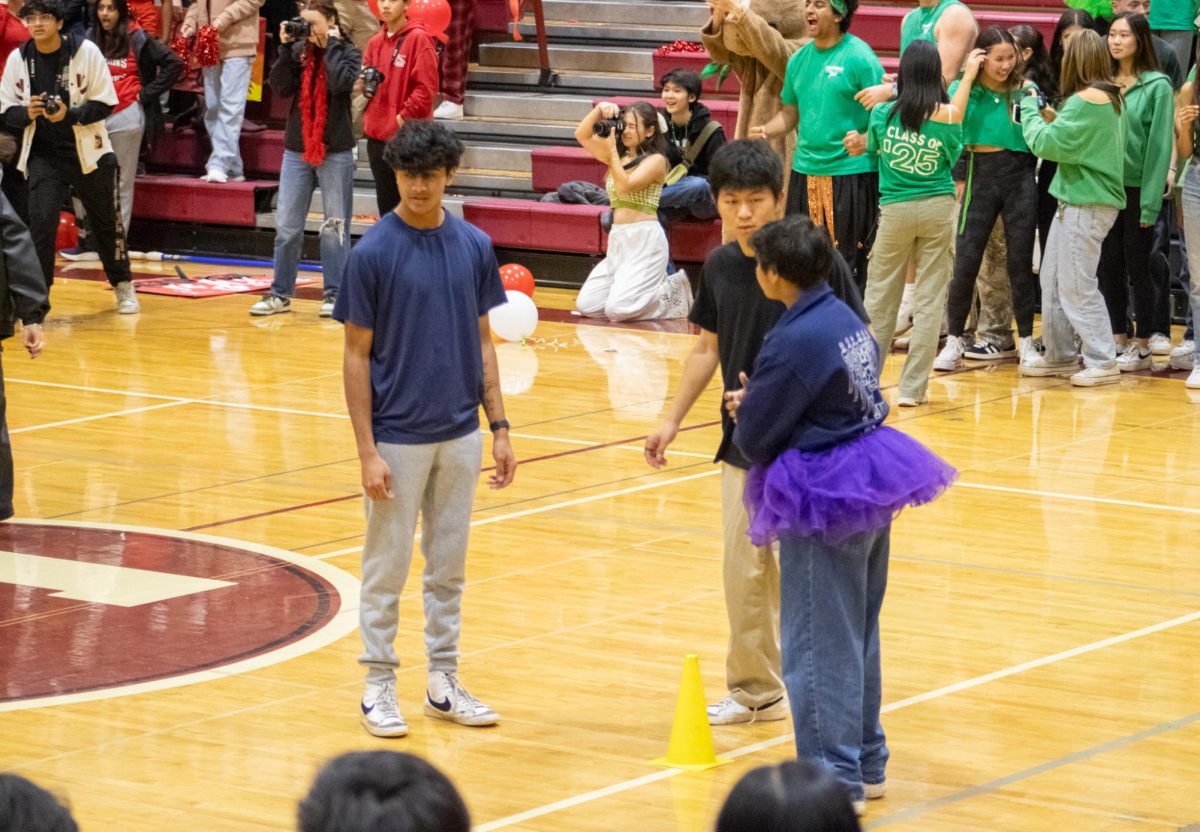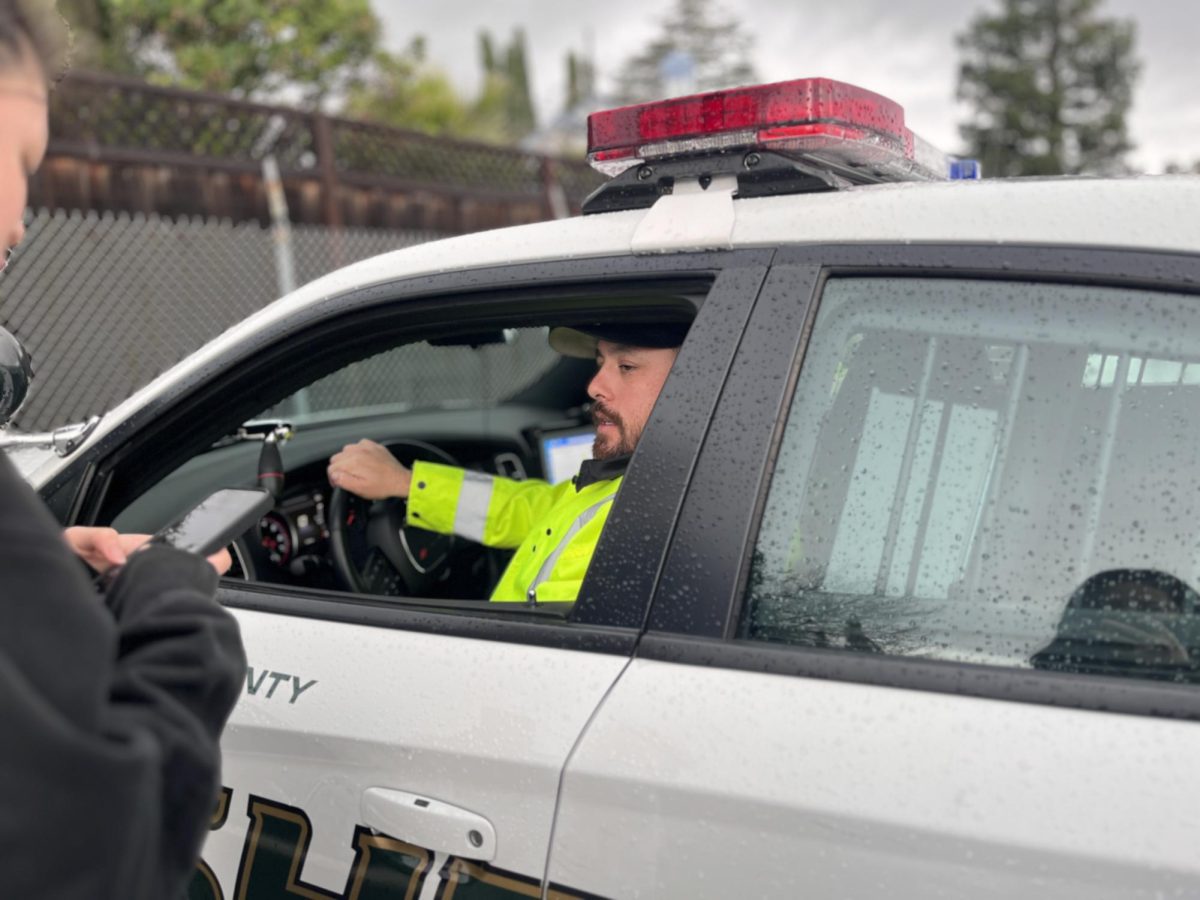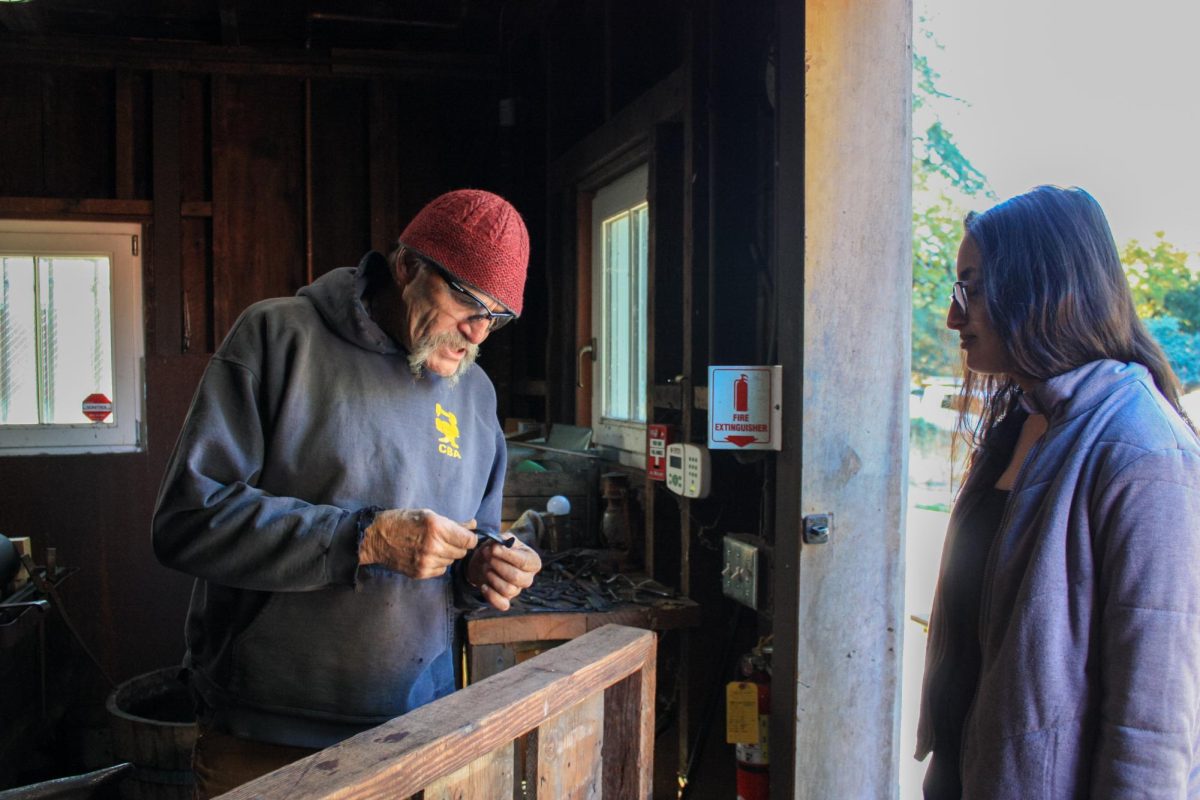A wooden frame is placed at the center of the academic rally, but it doesn’t hold an ordinary purpose. Rather, it’s a representation of the LBGTQIA+ community’s rite of passage: coming out of the closet. The ‘ closet door’, a simple wooden frame with multi-colored handprints plastered all over it draws a crowd of students. Each student writes a quirky message on their whiteboard and steps through the frame. The act seems simple, but the implications behind it are not.
While it may seem simple to come out in our day and the area we live in, each LGBTQIA+ person who reveals their gender or sexuality becomes vulnerable to possible backlash from their close friends and family. But when they finally step outside the closet door, they can look back and reflect on how far they’ve come.
For LGBTQ+ History month, three individuals share the story of their journey to outside the closet door.
JUNIOR OLLIE VENZON
SEXUALITY/GENDER: NON-BINARY, MASCULINE OF CENTER (gender identity which does not fit within the binary of male and female, but tilts toward the masculine side of the gender spectrum)
Confrontation.
It’s what junior Ollie Venzon had feared when they wanted to reveal to their parents that they were actually non-binary. Venzon says that they aren’t the best at talking, so when they had come out to their parents, they circumvented their fear of confrontation.
Venzon was waiting for friends outside of the clothing store Hot Topic with their mom by their side and a letter in their hand. Their mind was racing with thoughts, wondering how their mom would react when Venzon ‘s friends would finally arrive and Venzon would give their mom the letter. When Venzon’s friends arrived, Venzon handed– or threw, as their friend described– the letter at their mom. While saying goodbye to their mom, cuss words were stringing through their mind.
They gave clear instructions to their mother: not to read the letter until they were far apart from each other.
While the instructions were simple, the act of coming out was not. The letter laid out a piece of Venzon’s identity– a part that no one in their family knew, and a part that they were tired of hiding. In Venzon’s mind, they knew that they were non-binary since they were 14. It was time for them to reveal it to their mother. They had written the letter a week prior and had been planning to tell their mother for quite a while.
But before that, Venzon needed to learn for themselves, who they were. As Venzon recalls, it was a process to find the label that would fit. Although the process was made easier by the internet, it took some time before Venzon came to the conclusion that they were non-binary.
“I originally thought that I was genderfluid, meaning I would go between genders, like one day I would be a boy, and the next day I wouldn’t have a gender, and the next day I would be a girl,” they said. “And then I just stuck with plain old non-binary, and now I call myself non-binary and masculine of center.”
Although they had the notion that their mom would be supportive, they weren’t sure.
“I wouldn’t have [come out] if I didn’t think I was safe at the time,“ they said.
But their worries soon dissipated as a notification for a text sprang up. And another text. And another text. They were from their mother.
“She sent me a series of texts because they could not send at once,” they said. “I had a really bad phone back then, so it was messy reading it.
Venzon continued, “[The texts were] something along the lines of ‘I support you no matter what. You’re always going to be my child, and as you grow up you’re going to go through a lot of identity changes– who you’re going to be is going to change. Even I have gone through many identity changes and label changes and that is going to happen to you too and I’m going to be here through it all.”
How they came out to their dad was different. Because Venzon and their dad have differing political views on many subjects, Venzon knew that their dad would have a difficult time understanding it. According to Venzon, their gender identity was revealed in the middle of a breakdown. Their dad seemed supportive, but the conversation diffused into the air as soon as it was released.
“I told him then and he was mostly supportive,” Venzon said. “And then we never talked about it again, and then I was like, wow that was a really bad way to come out, I should really settle this.”
And so, Venzon had written another letter to their dad and stepmom through email.They wrote it after the San Jose Pride Parade, which gave Venzon motivation to officially come out. The letter allowed Venzon to express their thoughts in a way that the breakdown could not– in a coherent and organized manner. Venzon had even included resources to explain what they could not.
Although Venzon had come out to their dad only this year, he was already very supportive, even when he didn’t completely understand yet. As for Venzon’s mom, since Venzon has been out for a few years, it isn’t something that needs to be discussed– besides the occasional joke.
“I just remember my mom commenting ‘teenage girls are so annoying, I’m glad I don’t have one of those. It was kind of nice.”
Junior Ollie Venzon
Venzon’s grandmother had learned that they were non-binary in a similar way, and according to Venzon, it wasn’t really a big deal.
“My grandmother who found out by an interview that I did when I was fourteen about being non-binary and it was published online,” they said. “Apparently she was searching up my name for some reason and she called me and she was like ‘So i heard that you’re gay.’”
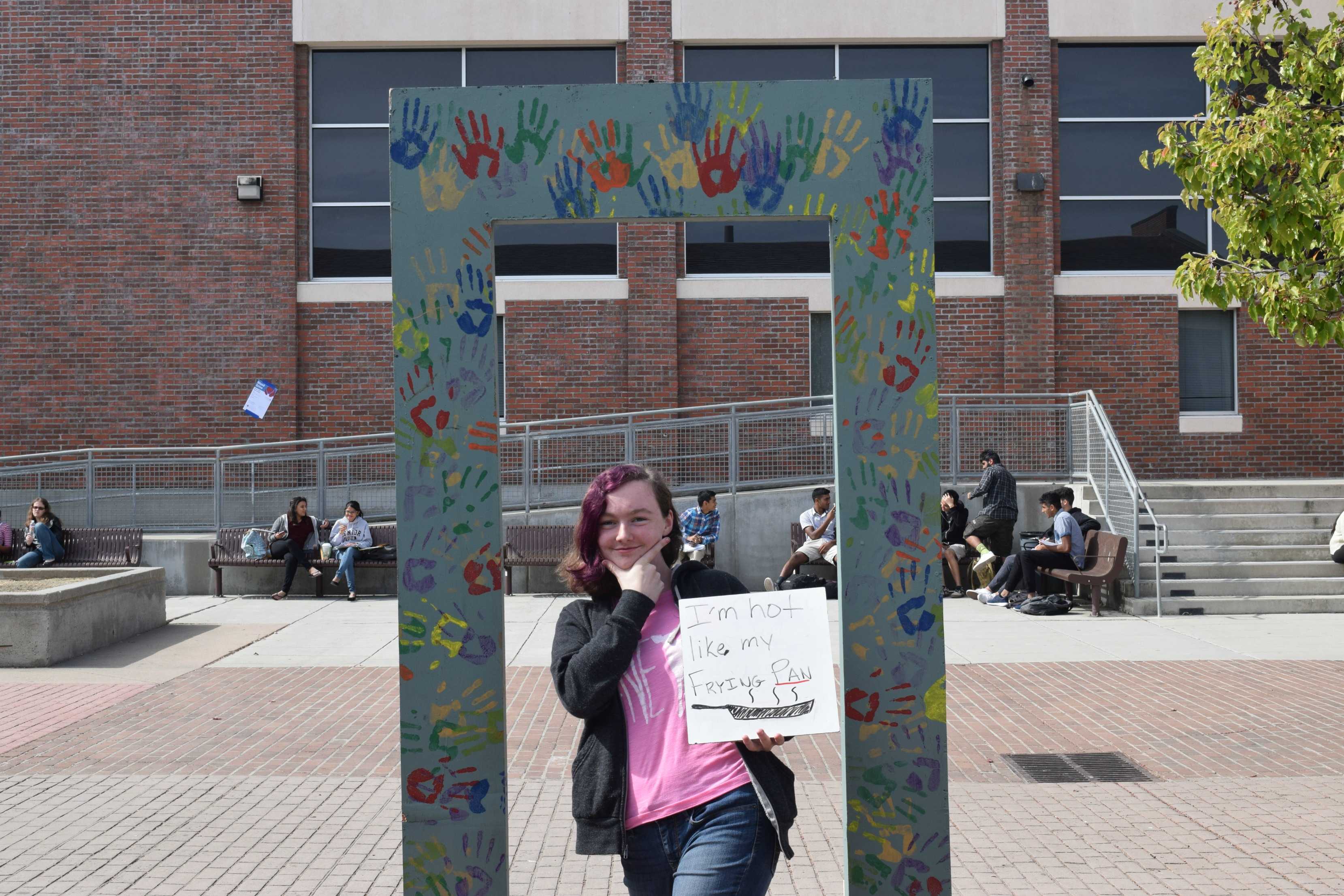 SOPHOMORE REBECCA ARMSTRONG
SOPHOMORE REBECCA ARMSTRONG
SEXUALITY/GENDER: PANSEXUAL: (not limited in sexual choice with regard to biological sex, gender, or gender identity)
For sophomore Rebecca Armstrong, learning that she was pansexual wasn’t a question of ‘why.’ Instead, it was a question of ‘why not?’ While Armstrong believes that some people let their sexuality define them,pansexuality is only a small part of Armstrong’s complex identity.
About a year and a half ago, Armstrong had started questioning her sexuality– she didn’t know if she liked girls or not. She knew that she liked guys, but could not tell if she could ever have a crush on a girl. Regardless, she had always thought of herself as an ally. As an ally, she was involved greatly in the lgbt community, meeting many people of all genders and sexualities– one of them being a girl. Although they were friends at first, soon, Armstrong started developing a serious crush.
“The more I hung out with her, the more it came apparent that I was [attracted to her],” Armstrong said. “It’s really just kind of a simple thing, it’s like if I was friends with a guy and hung out with him a lot and I felt feelings towards him –’Oh, ok I have a crush’.”
Armstrong had considered herself open about her sexuality before coming out to her family. She considered her true coming out moment a month or two prior, when she realized that she didn’t care if anyone knew. And so when she revealed her pansexuality to her parents, it was rather nonchalant.
“At first, I was just telling my friends like a secret thing,” she said, “but then like a month before I came out to my parents I was like ‘You know what, I just don’t care anymore if anyone knows and that’s when I considered myself out.”
Sophomore Rebecca armstrong
Armstrong and her family were having dinner when she first revealed her frustration at the fact that all the cute girls were taken. Her parents were surprised.
“I was having a discussion about two of my friends who were lesbians,” Armstrong said. “I was saying [that] all of the cute girls are always taken, and she [asked me if I] would date them and I was like ‘yeah!’ And she was like ‘oh wait really’.”
Her parents were supportive of her– she knew that they didn’t care, but warned her about the hardships and discrimination that she might face.
“They had made sure to tell me that they were fine with anything,” she said, “so I knew they were pretty accepting. They didn’t care if I was gay or not, but they would be worried for my safety and getting jobs and things, because other people would discriminate”
And while she was pansexual, and her crush was lesbian, it wasn’t the fairytale ending that Armstrong had hoped for–Armstrong’s crush was taken.
SENIOR OLIVE WU
SEXUALITY/GENDER: AGENDER (someone who identifies as without gender)
The concept of gender for senior Olive Wu is not only about whether a person is a boy or girl, but rather a sense of self. Wu’s realization of their gender came with the help of Tumblr in eighth grade—more of a learning experience than anything else. Unaware to the various non-binary genders, they went in search to a label that fit them. Finding a list of the differing labels on Tumblr, they went in search for one that fit who they felt. “Demigirl” showed up as one of the genders listed.
Demigirl intrigued Wu as they thought that they felt like a girl but brought up the question:what is a girl anyways? With that thought, they decided to not confine themselves to anything and in their eyes, that was a good decision to make.
“I honestly feel more comfortable with myself when I just present myself as a person, not with a gender or anything”, Wu said.
Feeling like they were lying to others, Wu eventually came out as agender to their friends on Facebook, one of whom was their mother. Their mother was not exactly with them at the time to show her initial reaction, but their sister Rachel was there to witness it. It was just a simple question.
“Hey Rachel, do you know what this agender means?”
The end result was an awkward topic that Wu has forgotten, but had a satisfying end result. Their mother started to have a change of heart.
Before Wu came out on Facebook, their mother was extremely conservative and against the LGBTQIA+ community. But now, she is slowly starting to understand and be more supportive.
“I don’t expect her to do a complete 180° on it, but like it was nice to know after she knew that people like me existed and ‘oh woah, your child is actually like that’ that she started to actually open up and educate herself about it”
Senior olive wu
Their sister, on the other hand, is more like a best friend to them and has supported them throughout. Like Venzon, Wu cracks jokes about their gender often and throws it out a lot. Much like the infamous, girls in the front guys in the back kind of deal at the choir concert when variations was taking a group photo. Wu’s immediate reaction was to lean over to their friends say, “does that mean I go like, in between?”.
That being said, the rest of their friends are supportive as well but at the same time do not understand their gender and continue to refer to them as “she”.
“Most people, they acknowledge the fact and they look at my facebook posts and they’re like ‘oh yea I support you’ and they message me”, Wu said, “and they’re like ‘Oh I’m very happy you came out, like I’m very supportive, let me know if I can do anything, blah blah blah’ but then they’re the same people who at school they go ‘oh hey look at Olivia, she’s a gi– not like ‘she’s a girl’ but she left her backpack in the classroom, stuff like that.”
It might be because this is a new idea that there are more than two genders that are common today. Even then, Wu can’t help that uncomfortable, anxious feeling inside whenever a teacher or classmate misgenders them, even though they came out to teachers earlier this year. They can’t help but help feeling apprehensive to correct them though, as they feel it would be inappropriate to stop the class to correct the teacher.
“It’s kind of sad honestly that I’ve kind of gotten used to it [misgendering] but there’s always that kind of inner cringe type of feeling where it’s like ‘nope you kind of got it wrong I want to correct you but i feel like, i feel like in just like passing situations, … it doesn’t seem like an important issue”, Wu said.
Despite all of that, Wu’s true coming out, to them, was when they were able to tell people an important part of themselves to everyone they know.
“I feel like you’re not knowing me if you don’t know this huge part of me, so, basically my real coming out was just kind of letting people know, ‘hey this is part of me, if you still wanna be friends I’m here”, Wu said.

















